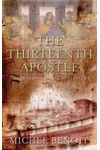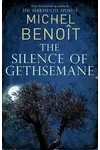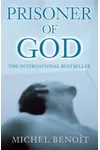Picture a French scholar who traded a monk’s robes for a novelist’s pen, weaving tales that challenge faith and history—meet Michel Benoit! A former Benedictine monk with a Ph.D. in Pharmacology, Benoit blends religious intrigue with thrilling narratives, captivating readers worldwide. His journey from a cloistered life to international bestseller is as gripping as his novels.
Benoit’s unique perspective, shaped by decades of theological study and personal sacrifice, fuels his storytelling. His works, like the bestselling The Thirteenth Apostle, invite readers to question historical narratives through a lens of suspense and scholarship. Ready to dive into his world? Let’s explore the man behind the mysteries.
The Making of Michel Benoit
Born in France, Michel Benoit initially pursued a scientific path, earning a Ph.D. in Pharmacology under the mentorship of Nobel laureate Jacques Monod. Yet, at 22, a spiritual calling led him to the Benedictine order at the abbey of Saint Benoît sur Loire, where he took the name Brother Irenee. For 22 years, he lived as an unordained monk, immersing himself in religious study. However, his unconventional ideas clashed with the Church’s hierarchy, leading to his departure. This pivotal moment sparked his writing career, beginning with his 1992 memoir, Prisoner of God.
Benoit’s monastic experience and scholarly background became the foundation for his literary voice. His transition from science to spirituality to storytelling reflects a lifelong quest for truth, which resonates in his works. His ability to weave complex ideas into accessible narratives set him apart in the literary world.
Michel Benoit’s Unforgettable Stories
Benoit’s bibliography is a tapestry of religious scholarship and suspense. His debut memoir, Prisoner of God (1992), offers a candid look at his monastic life, exploring themes of solitude, sexuality, and institutional control. The book’s international success established him as a bold new voice, unafraid to critique the Catholic Church.
His first novel, The Thirteenth Apostle (2006), is a historical thriller inspired by his research into the life of Jesus Christ and the Dead Sea Scrolls. The story follows Father Nil, a Benedictine monk, as he uncovers secrets that threaten the Vatican. Critics praise its blend of scholarly depth and page-turning suspense, appealing to fans of Dan Brown and Knights Templar lore. Another standout, The Silence of Gethsemane, reimagines biblical stories with emotional nuance, offering fresh perspectives on Jesus’s life.
Benoit’s style is marked by meticulous research, vivid characters, and a knack for blending fact with fiction. His themes—faith, power, and hidden truths—challenge readers to rethink historical and religious narratives. Whether crafting essays, travelogues, or thrillers, Benoit’s work invites intellectual curiosity and emotional engagement.
Why Michel Benoit Matters
Michel Benoit’s impact lies in his ability to bridge scholarly insight with mainstream appeal. His novels and memoirs resonate with readers seeking more than entertainment—they offer a lens into the complexities of faith and history. By drawing on his monastic and academic background, Benoit challenges dogmatic narratives, encouraging critical thought in an accessible way.
His influence extends beyond literature, inspiring discussions about the Catholic Church’s role in shaping history. While not a household name like Dan Brown, Benoit’s niche following appreciates his nuanced approach to religious thrillers. His legacy is one of courage, urging readers to question authority and seek truth, no matter the cost.
- Born: Date unknown, France
- Key Works: Prisoner of God (1992), The Thirteenth Apostle (2006), The Silence of Gethsemane
- Notable Fact: Spent 22 years as a Benedictine monk before becoming a writer
Snag The Thirteenth Apostle and dive into Michel Benoit’s thrilling world of faith and mystery! His stories promise to captivate your mind and spark your curiosity.


